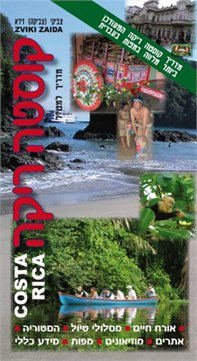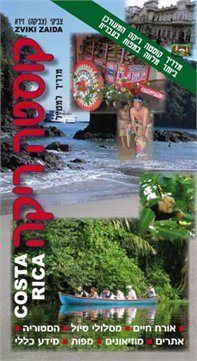Costa Rica travel guide
Costa Rica travel guide
Couldn't load pickup availability
- Costa Rica travel guide
- 2010
- Zvika Zida
- Orion
Costa Rica - in Spanish "the rich coast", is the name given by the Spanish conquerors to this green land about 500 years ago. Today, everyone knows that there is no gold and precious stones here, but the name given to the country is appropriate for it, due to the wealth of its wonderful and diverse nature.
Costa Rica today is one of the leading countries in the field of environmental tourism. About 25% of its territory is protected in nature reserves, national and private parks and biological reserves, which provide protection, home and refuge for a wide variety of wild animals. You can travel around the country on foot or by car, travel through rain and cloud forests, sail through canals, climb active volcanoes, bathe in the sea, in hot springs and waterfall pools, ride horses, watch whales and dolphins, sunbathe and enjoy various types of adventure sports: canopy ( Omega among the treetops), rafting, fishing, mountain biking, diving sites, surfing and more.
The services for tourists in Costa Rica are excellent: plenty of hotels and hostels at all levels, cheap, safe and widespread public transportation and wonderful and varied evening activities.
Costa Rica is not the birthplace of coffee, but the "golden beans", which arrived there at the end of the 18th century, became the most profitable agricultural product, which made a considerable contribution to the development of the country. The wonderful coffee of the "Arabica" variety is grown on farms on the slopes of the mountains and is served in meals and in the excellent cafes.
Costa Rica is not the birthplace of soccer either, but it is the national sport and a central part of the country's culture. The horse parades and bullfights are also very loved by the residents of the country.
Costa Rica is a democratic republic with a stable regime and the standard of living is the highest in Latin America. The abolition of the army in 1949 directed resources to high-level education, quality health and a flourishing economy.
Costa Ricans are called "Ticos". They are quiet, kind, smiling, family people, dance lovers and patriots. The women enjoy full equality, play central roles and in addition bear the burden of the traditional housework and the education of the children. Costa Rican culture includes mostly Spanish elements and a few Indian and Jamaican elements.
In conclusion: Costa Rica is a wonderful and special place, which excels in beautiful nature, security, a prosperous economy and a stable government.
The residents await you with open arms, and with the blessing of "Pura Vida" - "pure life".


